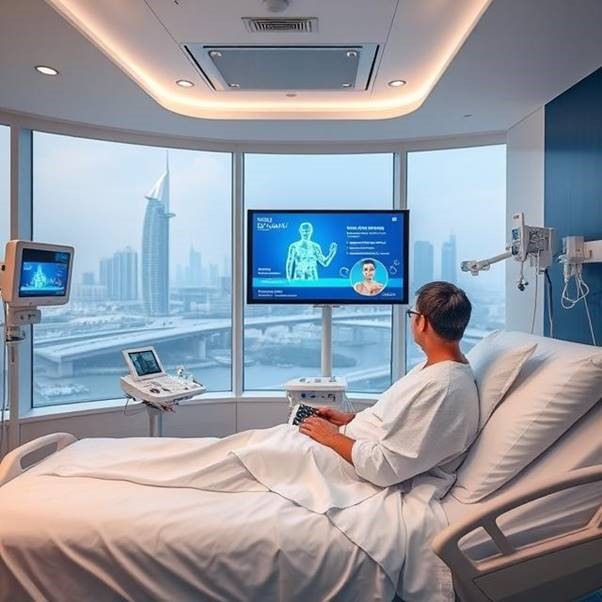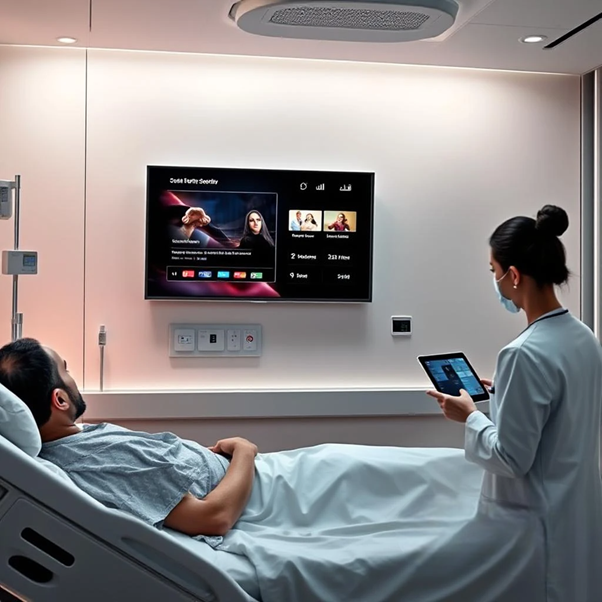In today’s digital age, the integration of IPTV (Internet Protocol Television) in healthcare settings has revolutionised patient care delivery. From hospitals to clinics, the use of smart screens powered by IPTV & Middleware technology is enhancing the overall healthcare experience for both patients and medical professionals.
Known widely as HEALTHCARE TV, this technology bridges the gap between patient comfort and clinical efficiency. Through personalised entertainment, educational content, and real-time communication tools, IPTV is redefining how hospitals engage with patients and optimise operations, especially in fast-growing healthcare regions like UAE, and Saudi Arabia.
Understanding IPTV in Healthcare

IPTV, or Internet Protocol Television, delivers television content through IP networks instead of traditional satellite or cable formats. In the context of healthcare, IPTV systems are specifically tailored to serve hospitals, clinics, and medical centres—commonly referred to as Healthcare TV or IPTV for Hospitals.
Unlike legacy television systems that offer limited channels and static content, Hospital IPTV platforms are interactive, dynamic, and highly customizable. Patients can watch on-demand videos, receive appointment reminders, access real-time hospital information, and even view educational modules related to their treatment plans—all from the comfort of their hospital bed.
Why IPTV Matters in Healthcare?
The adoption of IPTV in medical settings is not just a tech upgrade—it’s a strategic enhancement of the patient journey and hospital operations.
1. Enhanced Patient Engagement
Today’s patients are digitally inclined and expect more than a standard TV. IPTV provides personalised interfaces that can display welcome messages, treatment schedules, dietary recommendations, and multilingual support. This significantly improves the patient’s emotional well-being and involvement in their care.
2. Real-Time Education and Communication
IPTV systems can deliver customised health education videos based on the patient’s diagnosis. For example, a cardiac patient in a hospital might receive visual tutorials on lifestyle changes post-surgery. This increases health literacy and supports recovery.
3. Operational Efficiency
From broadcasting emergency alerts to providing staff training content, IPTV reduces administrative overhead and improves coordination across departments. Whether it’s integrating nurse call systems or streaming live announcements, IPTV for Hospitals makes communication seamless.
Key Benefits of IPTV in Hospitals
Personalized Content Delivery
IPTV allows patients to control what they watch and when. Beyond entertainment, this includes access to religious programs, cultural content, or therapeutic music. For international hospitals in the UAE and KSA, this feature helps cater to diverse cultural backgrounds.
Staff Training and Internal Communication
Hospital IPTV networks also support training videos and internal bulletins, ensuring that medical staff are always informed and up to date. It’s an effective, centralized way to communicate policies or deliver continuing medical education (CME).
Centralized Control and Analytics
Modern IPTV systems offer administrators data insights, such as which videos are most watched or which services are accessed the most. This feedback loop can guide content strategy and improve patient satisfaction scores.
Scalability and Cost-Effectiveness
Contrary to assumptions, implementing IPTV is often more affordable in the long run. With the right IPTV providers, hospitals can scale their system as they grow, add multilingual support, or integrate with EMR systems.
For facilities looking for the best IPTV options, it’s critical to partner with vendors offering robust support, cybersecurity compliance, and localized services.

IPTV in the Middle East: UAE and Saudi Arabia
The Middle East is rapidly emerging as a leader in healthcare digitalization. Regions like Dubai and Riyadh are investing heavily in hospital infrastructure, and IPTV in Dubai, and IPTV in Saudi Arabia are no longer fringe technologies—they’re becoming standard.
Adoption in Dubai
Private healthcare groups in Dubai, such as Hospitals, are increasingly adopting IP TV solutions to enhance patient experience and build brand loyalty. Smart patient rooms equipped with IPTV interfaces are now expected in premium hospital suites.
IPTV in Saudi Arabia
In IPTV Saudi Arabia, major hospitals like King Faisal Specialist Hospital use smart screens to deliver entertainment and clinical content. With the Vision 2030 agenda pushing for digital health transformation, IPTV KSA is projected to grow exponentially.
The Future of IPTV in Healthcare
As technology evolves, so does the potential of IPTV in hospitals.
AI-Driven Personalization
Future IPTV platforms will use AI to curate content based on patient demographics, health status, and engagement history, making education and entertainment even more relevant.
Smart Rooms and IoT
In next-generation hospitals, IPTV will be a central hub for smart room controls. Patients will adjust lighting, call nurses, or view diagnostics via one interface.
Virtual Healthcare Integration
Expect to see IPTV used for mental health sessions, physiotherapy guidance, and teleconsultations, bringing care directly to the patient’s bedside.
Cloud-Based IPTV
Cloud-based IPTV platforms offer scalability, remote management, and reduced hardware dependence—ideal for large healthcare networks.
IPTV Healthcare is no longer a luxury—it’s a necessity in modern hospitals striving to improve patient satisfaction, clinical outcomes, and operational efficiency. With the rise of smart healthcare in Dubai, the UAE, and Saudi Arabia, IPTV is playing a pivotal role in shaping the hospitals of tomorrow.
Healthcare providers looking to stay ahead of the curve should explore tailored IPTV solutions that meet the cultural, operational, and technological needs of their facilities.



